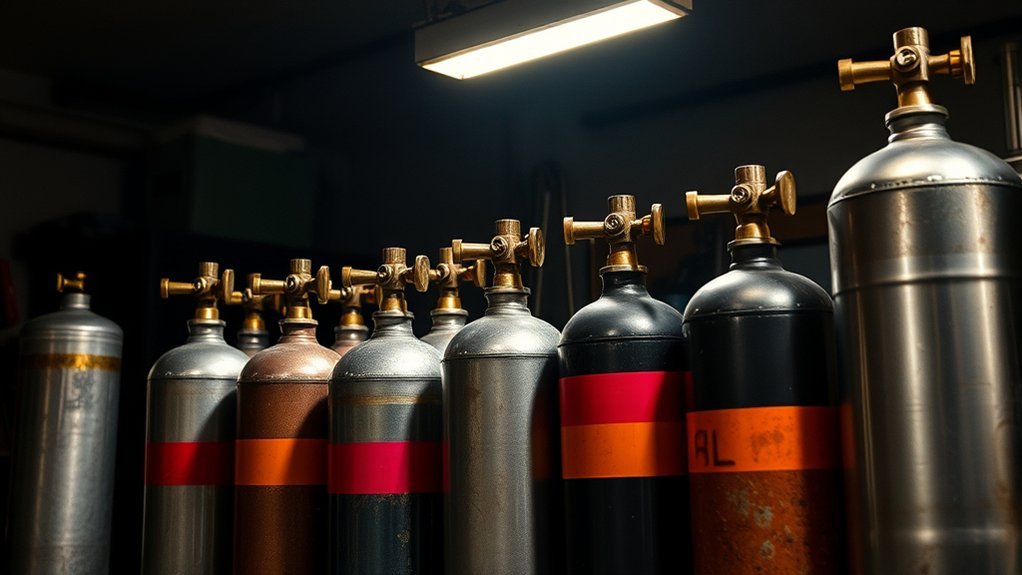Welding cylinders usually cost between $212 and $321, depending on the size and gas type. For instance, a 40 cubic foot inert gas cylinder is around $212, while an acetylene cylinder of the same size is about $321. Larger cylinders, like the 80 cubic foot option, can be more cost-effective for extensive projects. Remember, there are additional costs such as refills and maintenance, which you’ll want to take into account. Keep exploring to discover more about cylinder options and pricing.
Understanding Welding Cylinder Types and Sizes
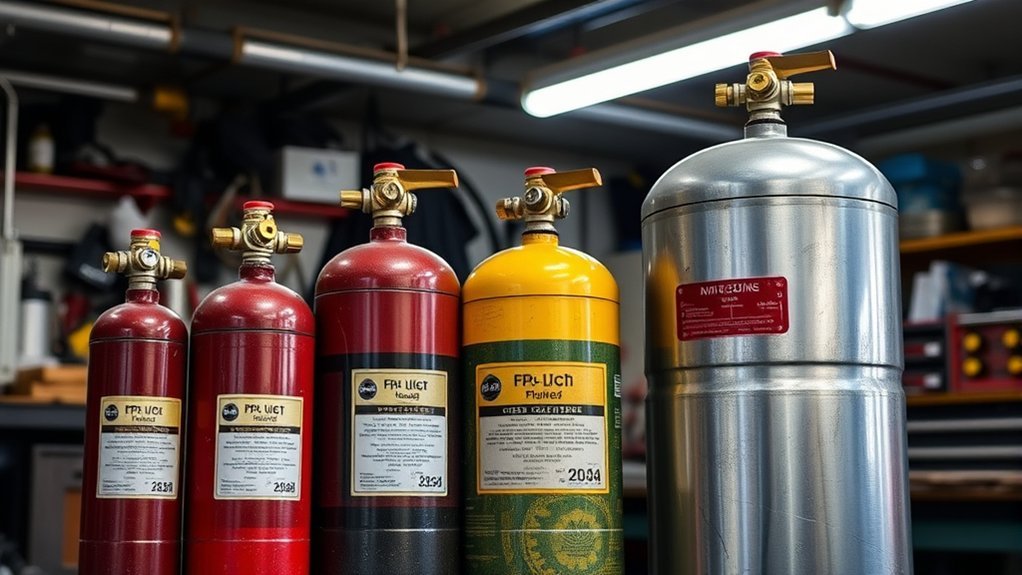
When you’re choosing welding cylinders, it’s crucial to understand the different types and sizes available, as each serves specific applications.
There are primarily two categories: inert gas cylinders, which are ideal for MIG and TIG welding, and acetylene cylinders, used for welding, cutting, brazing, and heating.
You’ll find sizes ranging from 40 to 80 cubic feet. The 40 cubic foot inert gas cylinder costs around $212, while the empty 40 cubic foot acetylene cylinder is priced at $321.24.
Sizes range from 40 to 80 cubic feet, with the 40 cubic foot inert gas cylinder costing approximately $212.
Larger cylinders, like the 80 cubic foot option, offer more cost-effective refills, making them suitable for high-demand tasks.
Each cylinder is constructed from durable materials and features DOT certification, ensuring safety and reliability.
Additionally, choose the appropriate valves, like brass CGA 580 for inert gases and CGA 540 for oxygen, to match your welding applications.
Understanding these details helps you make an informed decision.
Price Range for Welding Cylinders
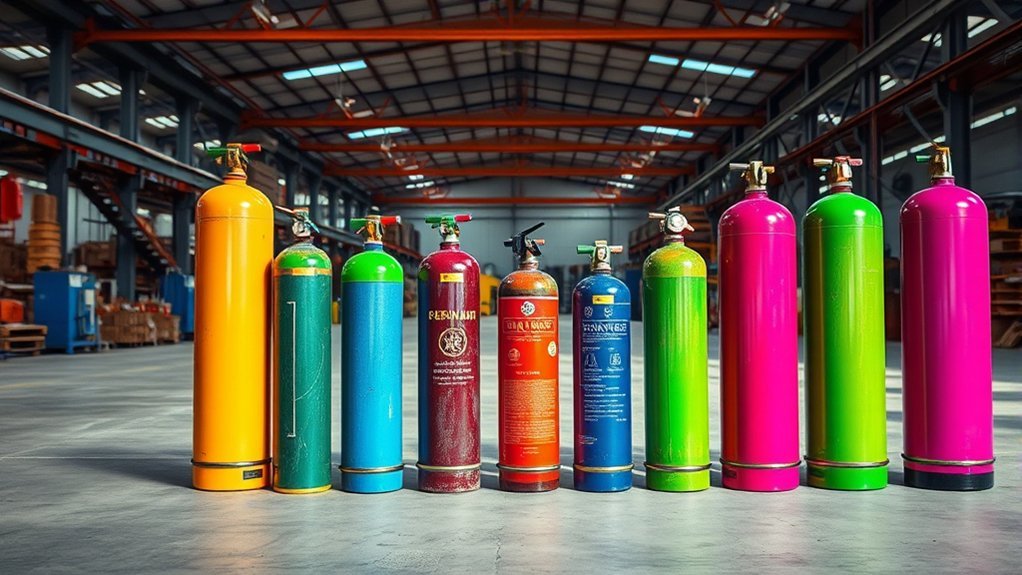
When you’re considering welding cylinders, prices vary considerably based on size and application.
For instance, an 80 Cubic Foot Inert Gas Cylinder can set you back around $253, while a smaller 40 Cubic Foot option is more affordable at approximately $212.
Additionally, it’s essential to account for refill costs, as these can impact your overall expenses.
Cylinder Size Pricing
How do the sizes of welding cylinders impact their pricing? The cylinder size greatly affects your purchasing decisions and overall pricing strategy. Larger cylinders generally cost more but offer longer operational time. Here’s a quick overview of the price ranges based on size:
| Cylinder Size | Approximate Price | Use Case |
|---|---|---|
| 40 Cubic Foot | $212.00 | Smaller, less frequent use |
| 60 Cubic Foot | $218.00 | Balanced option for various tasks |
| 80 Cubic Foot | $253.00 | Popular for extensive applications |
| 40 Cubic Foot | $321.24 | Acetylene for welding/cutting |
Understanding these price points can help you choose the right cylinder size for your specific needs while optimizing costs.
Refill Cost Comparison
While the initial investment in welding cylinders is important, understanding refill costs is essential for budgeting over time.
For instance, refilling a 40 cubic foot tank generally costs around $60, while an 80 cubic foot tank refill averages $70. Larger cylinders, like the 125 cubic foot tank, offer more cost-effective refills, typically around $70 every three months.
If you opt for smaller tanks, you’re likely to face higher overall costs due to increased refill frequency. A cost analysis reveals that the first-year total for an 80 cubic foot tank setup, including refills, can reach about $660, but annual costs can drop to around $360 in subsequent years, making larger tanks a more economical choice in the long run.
Additional Costs: Refilling and Maintenance
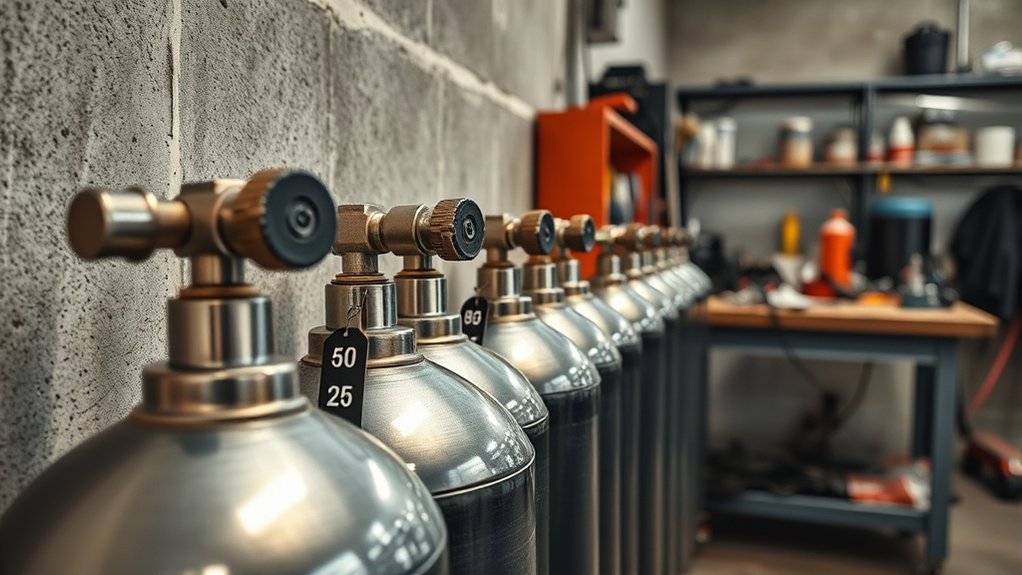
When you’re considering the total cost of owning welding cylinders, don’t overlook the expenses associated with refilling and maintenance.
Refilling a 40 Cubic Foot tank typically costs around $60, and the frequency of these refills can greatly impact your budget, especially if you’re using smaller tanks.
Additionally, regular maintenance, including checks on hydrotest dates and pressure gauges, is essential for safety and performance.
Refilling Frequency and Costs
Refilling your welding cylinders can greatly impact your overall operational costs, especially when considering the tank size and frequency of use.
For instance, a 40 Cubic Foot (CF) tank typically requires refilling every few months at an average cost of $60, while an 80 CF tank costs around $70 per refill.
In contrast, larger tanks like the 125 CF need refills roughly every three months. Although the upfront investment for larger tanks is higher, they can considerably reduce your refill frequency and annual expenses, averaging about $280.
To conduct an effective cost analysis, calculate your gas usage and flow rates. This will help you predict refill frequency and improve budgeting for your welding projects.
Maintenance of Gas Cylinders
Proper maintenance of gas cylinders is essential to guarantee safety and efficiency in your welding operations.
Regular cylinder inspections are important to identify any wear or damage. You should perform leak testing periodically to make sure that no gas escapes, which can be both dangerous and costly. Additionally, check the valve function to confirm it’s operating correctly.
Adhering to hydrotesting schedules is imperative; while this incurs extra costs, it’s necessary for safe operation. Remember, while welding gas cylinders don’t expire, improper storage can lead to gas mixtures separating, affecting performance.
Investing in larger cylinders may reduce refill frequency and lower costs over time, making maintenance more manageable and economical in the long run.
Safety Considerations for Storage
Guaranteeing safe storage of welding cylinders is essential for preventing accidents and minimizing costs. You must secure cylinders upright and away from heat sources to maintain cylinder security and reduce the risk of leaks or explosions.
Regular maintenance checks are important; inspect for leaks and verify safety valves function correctly to avoid costly refilling and hazards.
Additionally, proper ventilation is significant—store cylinders in well-ventilated areas to prevent gas accumulation, especially for flammable gases like acetylene.
Staying on top of hydrotest dates stamped on cylinders is also critical for regulatory compliance; neglecting this can lead to significant safety risks and unexpected expenses.
Prioritizing these safety considerations can save you money and protect your workspace.
Factors Influencing Cylinder Pricing
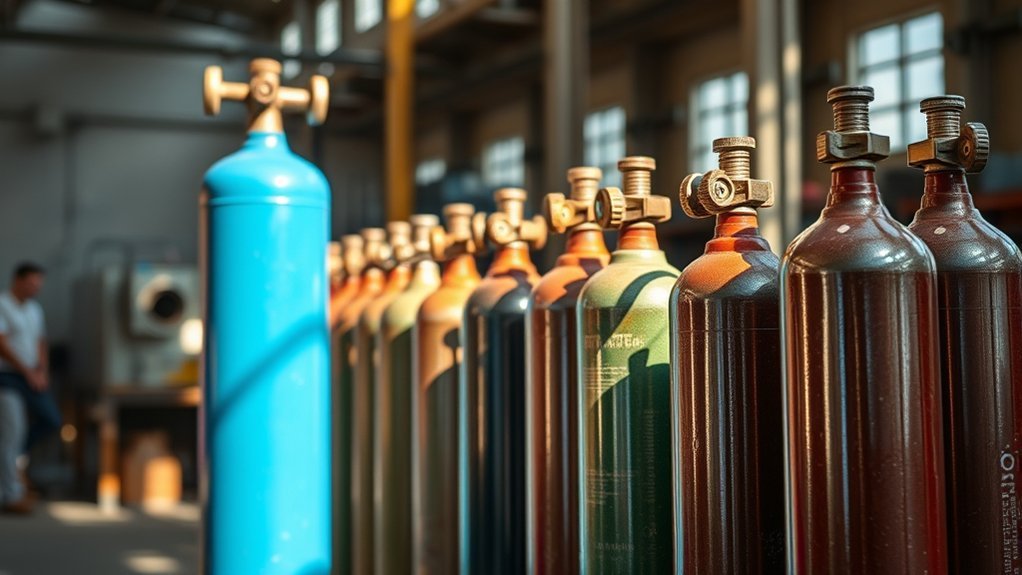
When considering the cost of welding cylinders, several key factors come into play that can greatly influence pricing.
First, the size of the cylinder considerably impacts its cost, with prices ranging from about $212.00 for a 40 Cubic Foot Inert Gas Cylinder to $253.00 for an 80 Cubic Foot Cylinder.
Additionally, the type of gas contained in the cylinder affects pricing; for instance, a 40 Cubic Foot Acetylene Cylinder may cost around $321.24 due to its specific applications.
Other considerations include:
- Cylinder materials: Different materials can affect durability and price.
- Ownership vs. rental: Owning a cylinder avoids ongoing rental fees, making it more economical over time.
- Ongoing refill costs: These can add up and influence total ownership costs.
Where to Purchase Welding Cylinders
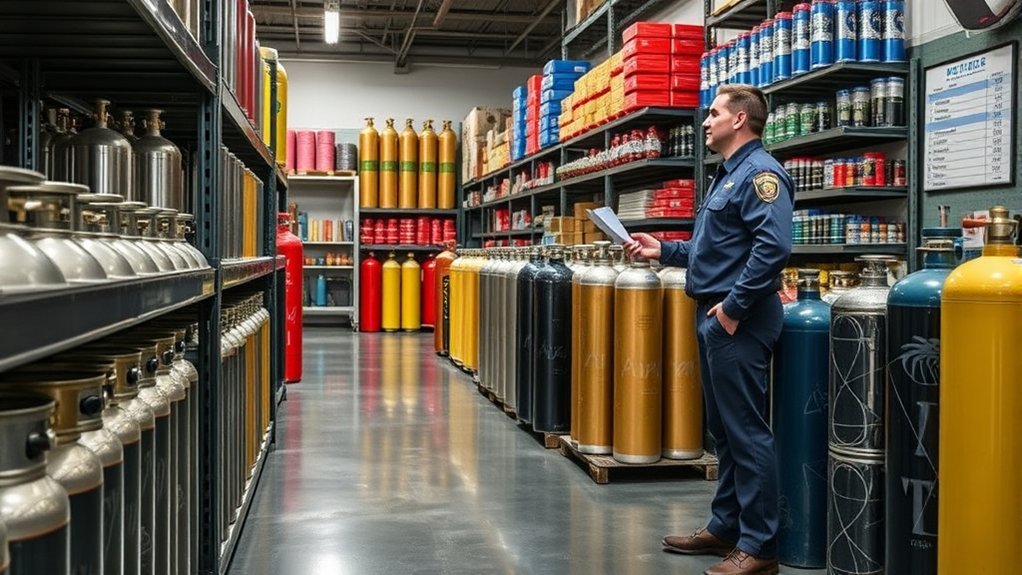
If you’re looking to purchase welding cylinders, several reliable options are available both online and locally.
Online retailers like Weldfabulous offer a wide selection of new, DOT-certified cylinders, ensuring you comply with safety regulations. For instance, expect to pay around $212.00 for a new 40 cubic foot inert gas cylinder or approximately $253.00 for an 80 cubic foot version.
If you prefer local suppliers, consider visiting gas dealers such as Northern Tool and AirGas. Many of these local suppliers also provide leasing and refilling services, which can often be more cost-effective than outright purchases.
Do keep in mind that shipping for full cylinders is typically limited to the Continental US, and air shipment isn’t available.
Tips for Choosing the Right Welding Cylinder
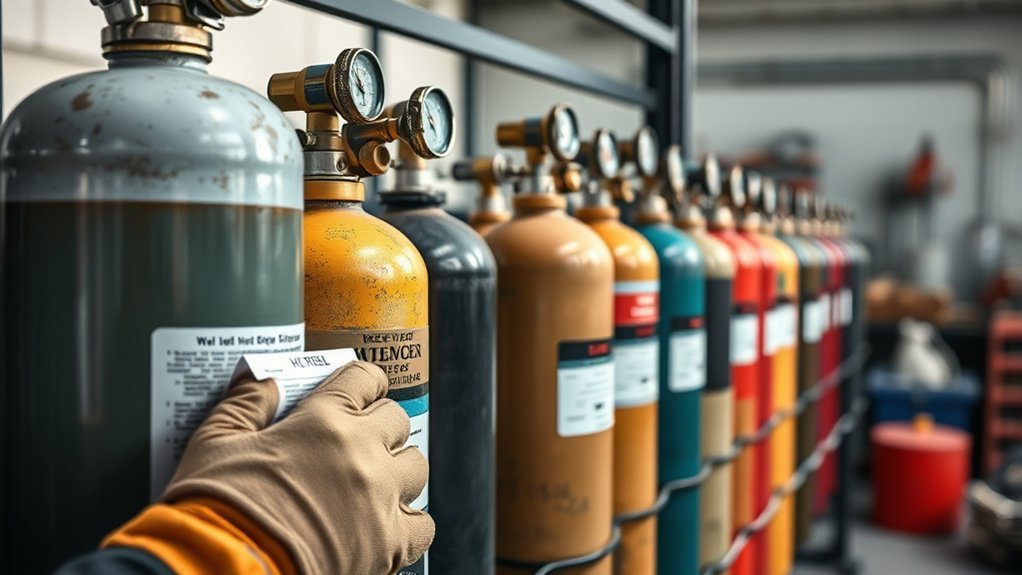
Selecting the right welding cylinder is essential to achieving ideal results in your projects. To make the best choice, consider the following factors:
Choosing the right welding cylinder is crucial for optimal project outcomes. Consider key factors for your selection.
- Gas Type Selection: Identify the gas needed for your application, such as 100% Argon for TIG welding or a 75% Argon and 25% CO2 mix for MIG welding.
- Welding Cylinder Compatibility: Confirm the cylinder you choose has the appropriate valve connection, like the brass CGA 580 for inert gases, to fit your welding setup safely.
- Cylinder Size: Evaluate your welding frequency; larger cylinders, like the 80 cubic foot option, provide longer usage and lower refill costs over time.
Additionally, check that the cylinder meets regulatory compliance with DOT certification and a recent hydrotest date.
Keep initial costs in mind, ranging from $212.00 to $253.00, and factor in ongoing refill expenses to budget effectively.
Frequently Asked Questions
How Long Do Welding Cylinders Typically Last?
Welding cylinders typically last 15 to 35 years, depending on usage and maintenance. To extend cylinder lifespan, regularly inspect for leaks, keep them clean, and store them upright in a well-ventilated area.
Can I Rent Welding Cylinders Instead of Buying?
Renting welding cylinders can be a smart bridge over a financial river. You’ll find welding cylinder rental options often more cost-effective for short-term projects, allowing for a favorable cost comparison against purchasing outright.
What Safety Measures Should I Follow With Welding Cylinders?
Always inspect your welding cylinders for leaks and damage. Guarantee proper cylinder maintenance by securing them upright, using safety gear like gloves and goggles, and keeping them away from flammable materials to prevent accidents.
Are There Specific Regulations for Transporting Welding Cylinders?
Yes, there are transportation guidelines for welding cylinders. You must secure each cylinder upright, avoid temperature extremes, and handle them carefully, ensuring they’re protected from damage while transporting, much like fragile glass in a storm.
Can I Use a Welding Cylinder for Different Gases?
You can’t use a welding cylinder for different gases without verifying gas compatibility. Always check cylinder identification labels to confirm safety and proper use, as mixing gases can lead to dangerous reactions and equipment damage.
Conclusion
In conclusion, investing in the right welding cylinder is essential for both safety and efficiency in your projects. With prices varying by type and size, you’ll want to weigh your options carefully. Consider not just the initial cost, but also refilling and maintenance expenses. After all, choosing the right equipment can mean the difference between a successful weld and a costly mistake. So, don’t just settle—make a choice that sparks your passion for welding!

